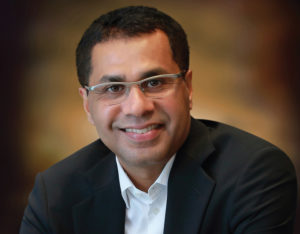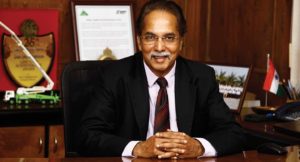Faizal Kottikollon, Chairman and Founder, KEF Holdings, believes that off-site construction technology will be crucial to meet the infrastructure needs of the country in sectors like healthcare, education and affordable housing

FOUNDER, KEF HOLDINGS
In 2007, Faizal Kottikollon, established KEF Holdings, which today has six business verticals – KEF Infra, Health, Education, Agri, Metals and Investments and operates across India, the Middle East and Singapore. KEF’s industrial forte lies in its ability to create integrated business processes and deliver off-site construction technology and solutions, including precast, prefabricated bathrooms, joinery and aluminum glazing. It has had a good growth phase in the last few years, with the announcement of several partnerships and projects. Over the last three years, it has identified its focus sectors as education, health, residential and commercial infrastructure sectors both in India and the Gulf Cooperation Council (GCC) countries. He believes that off-site construction technology provides the ideal solution to address the infrastructure needs in these markets.
In this story, Kottikollon, who has been named on the Forbes Middle East list of top 100 Indian leaders in the UAE in 2013, takes us through the growth of his organization over the last few years, the importance of making in India and the company’s contribution towards the same.
(As narrated to Poornima Kavlekar)
Going down the memory lane
One of our first projects was the holistic renovation and overhaul of the GVHSS Nadakkavu School in Kozhikode, which was completed in 2013. The project was channelled through our philanthropic arm, the Faizal and Shabana Foundation, which works closely with other stakeholders in government, business and community to promote initiatives that benefit the community. In 2014, we announced a US $245 million investment in India with the setting up of KEF Infra, our infrastructure arm in India. We started work on our 42-acre KEF Infra One Industrial Park in Krishnagiri, Tamil Nadu, which will meet India’s growing off-site construction needs. The facility is set to launch in the second quarter of this year.
In 2015, we forged a strategic partnership with Australian design firm, TAHPI. The KEF-TAHPI studio was set up in Dubai Healthcare City, which brings together the core competencies of KEF and TAHPI – hard and soft modular construction – respectively.
In India, we also delivered Karnataka’s first factory-built project, a residential project called ‘MeridiYEN’ to Yenepoya University in Mangalore. It was completed in just nine months, as compared to the usual 24 to 36 months averaged by conventional construction methods. We also entered into a tie-up with Manipal University to set up a state of the art R&D facility, which is focused around investing in the holistic development of the future generations of engineers. Another project completed in India in 2015, was an accommodation block for the prestigious B.K.S. Iyengar Yoga Retreat Center located in the village of Bellur in Karnataka.
Going forward
We’ve now laid the foundation for serious growth over the next few years. Healthcare and education will continue to be our focus sectors, and there will be an increased focus on the affordable housing sector as demand in each of those sectors continues to grow in India, the GCC and around the world. We are also committed to further innovating and developing robotics and automation technologies, which we hope to bring to these markets.
Views on Make in India
This is a very ambitious, yet extremely commendable goal. In order to achieve its targets of GDP contribution and employment generation, the government will need to continue to work closely with the private sector because this is where most job creation will take place.
The Union Budget for 2016-17 certainly looks to be a step in the right direction towards boosting manufacturing and infrastructure creation.
On infrastructure, the allocation of Rs 2.18 trillion for the building of roads and railways, will particularly drive much-needed development in the country. Additionally, the dedicated dispute redressal body for issues related to public-private partnership infrastructure projects will help alleviate concerns that are currently deterring foreign and domestic private investors in this sector. This will all be crucial in promoting India’s domestic manufacturing sector.
Needless to say, the simplifying of tax rules for start-ups and small businesses will create an environment that fosters and nurtures entrepreneurship and thereby boost job creation.
Potentially, a bright future
The IMF has forecast that India will continue to be the world’s fastest growing economy next fiscal with growth of 7.5 per cent, up from a predicted 7.3 per cent during the previous 12 months.
Over the last year, the Indian government announced its plan to build 100 new smart cities by 2020 and infrastructure development plans rose to the top of the government’s economic agenda. Furthermore, studies are projecting a growth of 8 per cent in the US$ 157 billion Indian construction sector over the next decade. The government has also mandated halving the minimum FDI requirement for construction development to US$5 million, which will hugely lower barriers for overseas investors and encourage incoming infrastructure investments into the country.
All of these factors make for a promising outlook for manufacturing in India. With manufacturing also having been placed very much at the heart of India’s budget, a solid foundation has definitely been laid by the government to catapult the manufacturing sector. However, investment and policy reform must go hand in hand and remain a continued effort of the government if we are to ensure a strong domestic manufacturing sector in the long term. There is also a continuing need for the government and private sector to work together when it comes to infrastructure.
KEF, making in India
KEF’s use of off-site construction and the KEF Infra-One Krishnagiri facility will bring advanced technology to the Indian construction industry, which is crucial to achieve the grander vision of making in India. The idea behind the KEF Industrial Park at Krishnagiri is to meet the various gaps existing in the Indian infrastructure industry. In India, it is often seen that projects, whether residential or commercial, do not get delivered on time due to a delay in completion, which in turn leads to costs inflating.
All of KEF’s projects will be built, from the design to the details, using the manufacturing capabilities of the KEF Infra-One Industrial Park, making it India’s first fully off-site destination. Through this Industrial Park, KEF Infra intends to collaborate with the community to reduce waste and pollution, share resources, create job opportunities and achieve sustainable development. The current production capacity is 5 million square feet a year and we are looking to expand that to 7.5 million in the near future.
KEF has also designed and developed a prototype of an affordable home in line with the government’s vision to rehabilitate lower income groups and can be produced at the KEF Infra One Industrial Park.
We have a workforce of over 500 people at the factory at our Krishnagiri facility, comprising of workers from across a range of socio-economic backgrounds. One of our focus areas is to create employment opportunities for the rural communities and villages around the KEF Infra One Industrial Park, located in Krishnagiri. The local residents have been hired to work in our facility, in addition to us working with local suppliers to address the needs of the factory and its workers.





